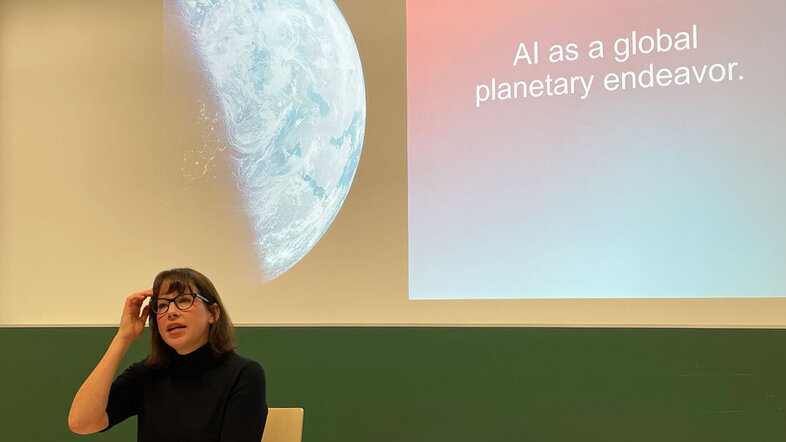Healing a world in crisis: AI as a double-edged sword
Humanity is facing pressing socio-ecological crises, such as biodiversity loss, pandemics, and climate change. Technologies can play a significant role in mitigating or exacerbating these crises. Therefore, we — the Research Group "Philosophy of Media and Technology" — considered it essential to bring international experts from academia and politics to Vienna to discuss the most urgent research and policy questions and challenges associated with these developments. The conference "AI and the Planet in Crisis – Climate, Sustainability, and Global Governance" took place at the University of Vienna under the patronage of UNESCO.
The challenge of climate-friendly AI
Artificial intelligence (AI) technologies have an ever-increasing impact around the world, making AI one of the leading technologies of the Anthropocene. AI can contribute to climate change due to, e.g., its huge energy and water consumption. On the other hand, it can also mitigate climate change by gathering and processing data on temperature change and CO2 emissions, transforming mobility systems to emit less, managing energy consumption, or nudging people toward more climate-friendly behavior. The link between AI and climate change is attracting increasing attention within academia, politics, and the media. However, the question of whether and, if so, how AI should be developed and deployed to mitigate rather than fuel climate change currently remains underexplored.
AI justice: From environmental to post-colonial issues
It is therefore important to discuss these "whether and how" questions and explore them from an academic and policy angle. In their keynote lectures, Aimee van Wynsberghe, professor of Applied Ethics of AI, and Benedetta Brevini, Professor of Political Economy, addressed the environmental and social costs of AI technologies. "We can observe a structural turn in AI ethics", van Wynsberghe stated, which includes a shift in perspective from seemingly merely technological problems to their political and social context. Van Wynsberghe welcomed this shift and emphasized that "the whole lifecycle of an AI technology has to be put under ethical scrutiny, not only the end product", including many layers, such as labor conditions, the material extraction, and the context of application. Brevini, in turn, called for the need to "engage more intensively with traditional and indigenous forms of knowledge," also in the digital realm.
As AI technologies predominantly benefit the Global North (including Australia) while the environmentally harmful extraction of resources and waste disposal take place in the Global South, various justice aspects need to be discussed, as was also highlighted by the keynote of Payal Arora. The digital anthropologist shed light on Indigenous perspectives on AI development and deployment, thereby promoting a post-colonial approach to AI. Post-colonial justice issues include questions of global justice as much as questions of intergenerational justice, as the way we develop and use technologies today will impact future generations in manifold ways, and which paths we take to (not) mitigate climate change will also have a great impact for future generations. All these aspects are key when considering how AI technologies can be ethically integrated into a sustainable and equitable future.
AI benefits vs. climate impact
However, real-world applications of AI also offer a hopeful view of the technology: Lidia Brito, Assistant Director-General for Natural Sciences at UNESCO, highlighted how AI is used within various UNESCO projects, e.g., for early detection of floods, droughts, and storms, for better understanding emerging diseases, or for monitoring and protecting endangered species and the world’s biodiversity. Austrian Ambassador Christoph Thun-Hohenstein provided thoughts on how AI can function as a seismograph for pressing socio-ecological questions when used within different artworks and art projects.
Like the examples by Lidia Brito on how to use AI to benefit societies, the keynote by renewable energy expert Daniel Kammen introduced examples of how AI can help transform societies’ mobility systems into more sustainable ones by providing means for smart and efficient use of energy, car availabilities, and traffic avoidance. Contrary to such more optimistic perspectives, the keynote by Rupert Read, a leading figure in climate activism, called for the need for more radical changes and for keeping the negative consequences of AI technologies in mind, which led him to a more skeptical perspective on AI in general.
While opinions vary on whether AI is ultimately doing more good or harm to the environment, there is broad agreement on one crucial point: the entire life cycle of AI must be considered when evaluating its ecological and social impacts. Moving forward, it is clear that we urgently need to establish a new global governance framework that addresses the far-reaching and intergenerational consequences of AI technologies — ensuring they are developed and deployed in a way that benefits both people and the planet.
Here you can rewatch Mark Coeckelbergh's welcome address (the Zoom password is provided).
She is a member of the German Committee Future Earth, the Center for Interdisciplinary Research at University of Bielefeld, the Young Academy of the Heidelberger Academy of Sciences and Humanities and an associate member of the Center for Environmental and Technology Ethics Prague.
He is a member of the High Level Expert Group on Artificial Intelligence for the European Commission. He is the author of AI Ethics, Green Leviathan, The Political Philosophy of AI, and Why AI Undermines Democracy and What To Do About It.
